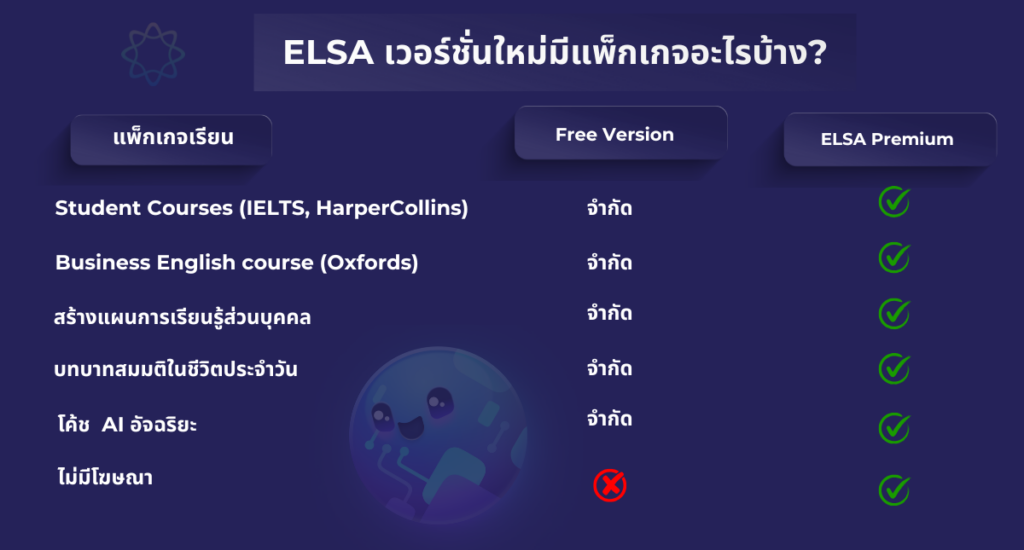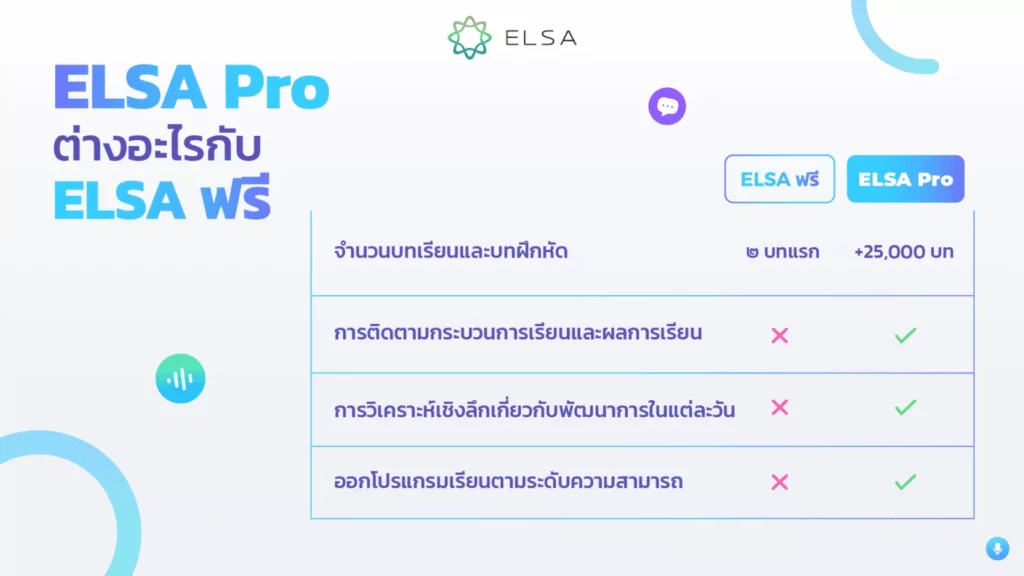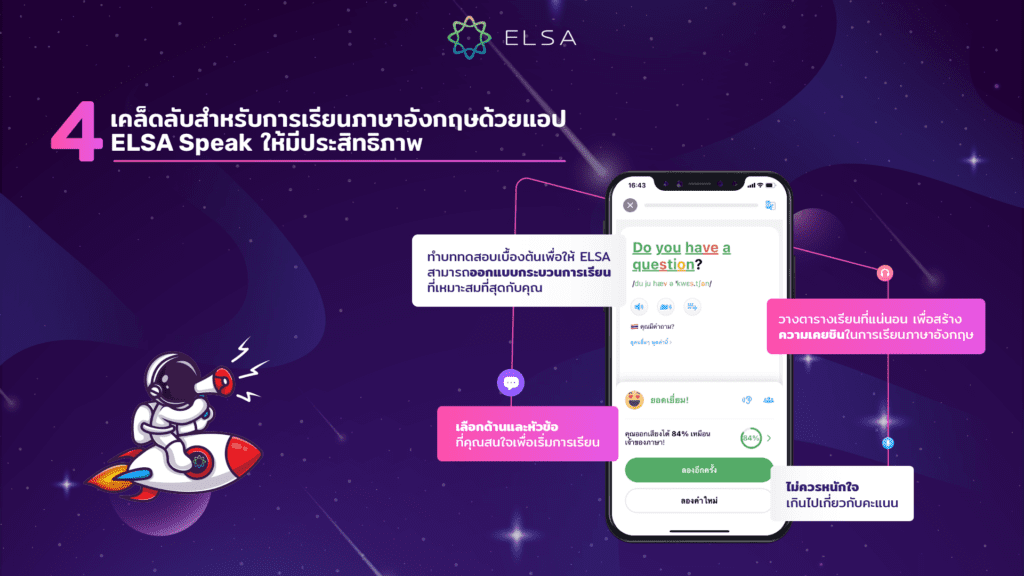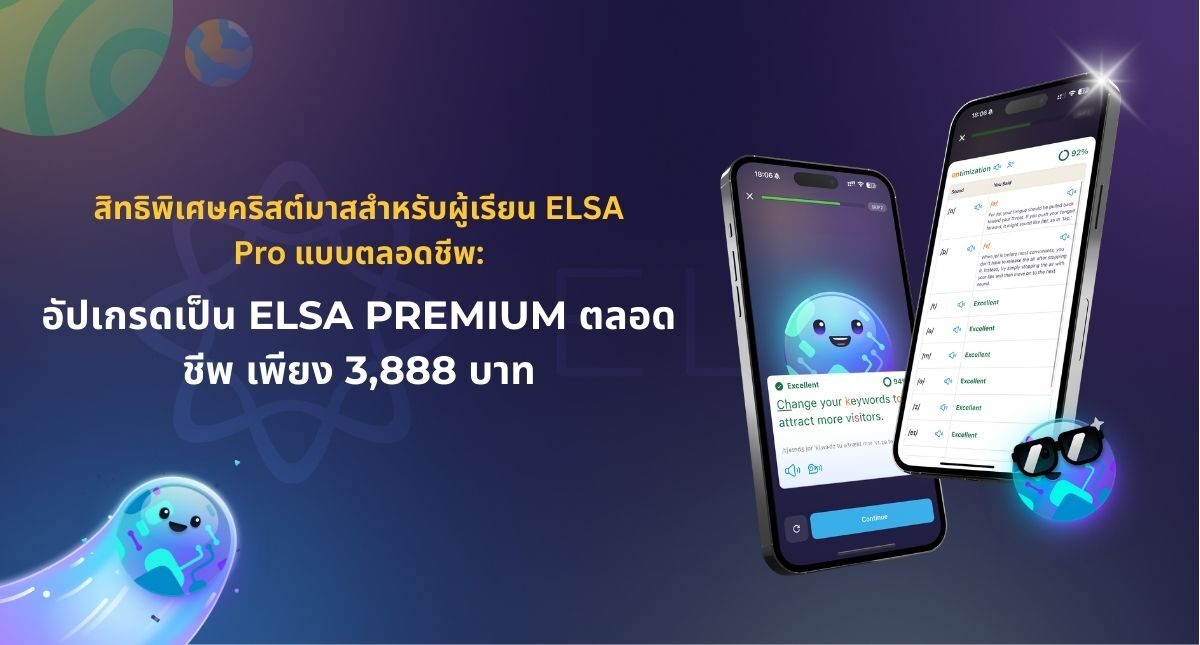กาลในภาษาอังกฤษเป็นความรู้พื้นฐานที่สำคัญสำหรับผู้ที่เพิ่งเริ่มเรียนภาษาอังกฤษ ในบทความต่อไปนี้ ELSA Speak จะรวบรวมความรู้ทั้งหมดเกี่ยวกับ อนาคตกาลสมบูรณ์ต่อเนื่อง (Future Perfect Continuous Tense) และแบบฝึกหัดที่เกี่ยวข้องเพื่อช่วยให้คุณสามารถใช้กาลนี้ได้อย่างคล่องแคล่ว ติดตามบทความด้านล่างนี้ด้วยกันนะ!
Future Perfect Continuous Tense คืออะไร?
อนาคตกาลสมบูรณ์ต่อเนื่อง (Future Perfect Continuous Tense) มีหน้าที่หลักในการแสดงและเน้นการกระทำ/เหตุการณ์ที่เกิดขึ้น/ต่อเนื่องจนถึง (ก่อน) จุดเวลาหนึ่งหรือการกระทำ/เหตุการณ์อื่นในอนาคต
สอบก่อนเข้าฟรี

Future Perfect Continuous Tense ตัวอย่างประโยค
At the end of this year, we will have been living here for 15 years.
(สิ้นปีนี้เราจะอยู่ที่นี่ครบ 15 ปีแล้วนะ)

| Future Perfect Continuous Tense จะไม่ซับซ้อนเลยเมื่อคุณเข้าใจการใช้ กริยาเติม ing เพราะรูปนี้ช่วยสื่อการกระทำที่กำลังดำเนินต่อเนื่องไปจนถึงเวลาใดเวลาหนึ่งในอนาคต |
โครงสร้าง Future Perfect Continuous Tense
ประโยคบอกเล่า
| S + will + have + been + V-ing + …*will= ‘ll |
ตัวอย่าง:
I think when we get there, Peter will have been cooking since 3pm.
(ฉันคิดว่าเมื่อเราไปถึงที่นั่น ปีเตอร์คงจะทำอาหารตั้งแต่บ่าย 3 โมงแล้ว)
She’ll have been working for that company for 5 years by the time you start working there.
(เธอจะทำงานให้กับบริษัทนั้นเป็นเวลา 5 ปีเมื่อคุณเริ่มทำงานที่นั่น)

ประโยคปฏิเสธ
S + will + NOT + have + been + V-ing + …*will not= won’t
ตัวอย่างประโยค Future Perfect Continuous Tense:
I won’t have been working until 7 this evening. I alwasy leave work at 5pm.
(ฉันจะไม่ทำงานจนถึง 7 โมงเย็นวันนี้หรอก ฉันเลิกงาน5โมงเย็นเสมอ)
Trust me! Our son won’t have been playing games for hours when we get home. He doesn’t like playing games that much.
(เชื่อฉันเถอะ! ลูกชายของเราจะไม่เล่นเกมเป็นเวลาหลายชั่วโมงจนกว่าเราจะกลับถึงบ้านหรอก เขาไม่ชอบเล่นเกมขนาดนั้น)

เข้าใจและใช้ Tense อย่างคล่องแคล่ว
วิธีใช้ Past Perfect Tense (กาลอดีตก่อนหน้า) ที่เข้าใจง่ายที่สุด
Past Simple Tense (อดีตกาลธรรมดา): โครงสร้าง หลักการใช้ แบบฝึกหัด
Present Perfect Continuous Tense โครงสร้าง ตัวอย่าง และแบบฝึกหัดพร้อมคำตอบ
ประโยคอดีตกาลต่อเนื่อง (Past Continuous Tense): โครงสร้างและแบบฝึกหัด
คำถาม Yes- No
ก. คำถาม Yes- No
| Will + S + have + been + V-ing + …? |
| Yes, S + will. No, S + won’t. |
ตัวอย่าง:
Will our daughter have been working hard until she finds a better job?
(ลูกสาวของเราจะไม่หยุดขยันทำงานจนกว่าเธอจะหางานที่ดีกว่านี้ใช่ไหม?)
Yes, she will. She’s very hard-working.
(ใช่ เธอขยันทำงานมาก)
Will that team have been discussing that problem for hours by the time our boss recommends a solution?
(ทีมนั้นจะไม่หยุดปรึกษาหารือเกี่ยวกับปัญหานั้นเป็นเวลาหลายชั่วโมงก่อนที่เจ้านายของเราจะเสนอวิธีแก้ปัญหาหรือ?)
No, they won’t. They have many things else to do.
(ไม่หรอก พวกเขายังมีสิ่งอื่นที่ต้องทำ)

ข. คำถาม Wh-
คำถามไม่ใช่ประธาน
| What/ Where/ When/ Why/ How/ Who(m) + will + (not) + S + have + been + V-ing +…? |
ตัวอย่าง:
What will the Sales Department have been focusing on by the end of this quarter, you think?
(คุณคิดว่าฝ่ายขายจะเน้นอะไรอย่างต่อเนื่องก่อนสิ้นไตรมาสนี้)
Where will the children have been playing since noon when their parents come to pick them up this afternoon?
(เด็ก ๆ จะเล่นที่ไหนตลอดบ่ายเมื่อพ่อแม่มารับในบ่ายวันนี้)
Before that company chooses a new supplier next year, who(m) will they have been working with for nearly 6 years?
(ก่อนที่บริษัทนั้นจะเลือกซัพพลายเออร์รายใหม่ในปีหน้า พวกเขาจะ (เคย) ทำงานกับใครมาเกือบ 6 ปี?)
คำถามคือประธาน
| What/ Who + had (not) + V3/ed + …? (be) |
ตัวอย่าง:
What will have been making her unhealthy for many months until she goes to hospital next month?
(อะไรทำให้เธอไม่แข็งแรงหลายเดือนจนกว่าเธอจะไปโรงพยาบาลในเดือนหน้า)
By the next appointment, who will have been leading the company to success since 2005?
(ก่อนการแต่งตั้งครั้งต่อไป ใครเคยเป็น และจะพาบริษัทไปสู่ความสำเร็จตลอดมาตั้งแต่ปี 2005?)

วิธีใช้ Future Perfect Continuous Tense
เราจะใช้ Future Perfect Continuous Tense เมื่อต้องการแสดงและเน้นการกระทำ/เหตุการณ์ที่เกิดขึ้น/ดำเนินต่อเนื่องไปจนถึง (ก่อน) จุดเวลาหนึ่งหรือการกระทำ/เหตุการณ์อื่นๆ ในอนาคต
ตัวอย่าง:
Before his retirement next spring, my father will have been working for that company for nearly 29 years.
(ก่อนที่พ่อจะเกษียณอายุในฤดูใบไม้ผลิหน้า พ่อของฉันจะ (เคย) ทำงานให้กับบริษัทนั้นมาเกือบ 29 ปีแล้ว)
Our son won’t have been reviewing his lesson for hours by the time we get home. He’s not a hard- working student.
(ลูกชายของเราจะไม่เรียนเป็นเวลาหลายชั่วโมงก่อนที่เราจะกลับถึงบ้านหรอก เขาไม่ใช่นักเรียนที่ขยันขันแข็ง)
สัญญาณเพื่อระบุ Future Perfect Continuous Tense
- by/ before + จุดเวลาหนึ่งในอนาคต: ก่อน…
by/ before lunch (ก่อนอาหารกลางวัน) by/ before this evening (ก่อนคืนนี้) by/ ก่อนงานแต่งข (ก่อนงานแต่งของพวกเขา) ฯลฯ
- at + จุดเวลาหนึ่งในอนาคต: ณ…
at 9pm (เวลา 3 ทุ่ม) at 10:30 am tomorrow (เวลา 10.30 น. พรุ่งนี้) ฯลฯ
- until + จุดเวลาหนึ่งในอนาคต: จนถึง…
until 9 this evening (จนถึง 3 ทุ่มวันนี้) until the next meeting (จนถึงการประชุมครั้งถัดไป) ฯลฯ
- by the end of + ระยะเวลาที่จะสิ้นสุดในอนาคต: ก่อนสิ้นสุด…
by the end of this month (ก่อนสิ้นเดือนนี้) by the end of the semester (ก่อนสิ้นภาคการศึกษา) by the end of this year (ก่อนสิ้นปีนี้) ฯลฯ
- when + clause ที่ใช้ Present Simple tense: เมื่อ…
when we get there (เมื่อเราไปถึงที่นั้น) when the meeting ends (เมื่อการประชุมสิ้นสุดลง) ฯลฯ
- before/by the time + clause ที่ใช้ Present Simple tense: ก่อน…
before/ by the time we call them (ก่อนที่เราจะโทรหาพวกเขา) before/ by the time she goes home (ก่อนที่เธอกลับบ้าน) ฯลฯ
หมายเหตุเกี่ยวกับการใช้ Future Perfect Continuous Tense
คำกริยาต่อไปนี้จะไม่ได้ใช้ในกาล Continuous โดยทั่วไปและโดยเฉพาะในกาล Future Perfect Continuous Tense:
ก. กริยาแสดงอารมณ์ เช่น เกลียด อยาก ต้องการ ฯลฯ
- like: ชอบ
- love: รัก
- dislike: ไม่ชอบ
- hate: เกลียด
- want: อยาก
- prefer: ชอบ….มากกว่า (ให้เลือก)
- ต้องการ: ต้องการ
หมายเหตุ: คำกริยา ‘like’, ‘love’, ‘dislike’ và ‘hate’ ยังสามารถใช้ในกาล Present Continuous เมื่อผู้พูดต้องการเน้นความชั่วคราวของอารมณ์นั้น แต่กรณีนี้ไม่มีมาก
ข. คำกริยาเกี่ยวกับความคิดความเห็น ฯลฯ
- think: คิด / ว่า
- believe: เชื่อว่า / เชื่อใน
- know: รู้ว่า/รู้เกี่ยวกับบางอย่างหรือบางคน
- understand: เข้าใจ
- remember: จำบางสิ่งในอดีต/จำว่าจะทำบางสิ่ง
- forget: ลืมบางสิ่งในอดีต / ลืมทำบางสิ่ง
- realize: ตระหนักว่า
หมายเหตุ: เมื่อคำกริยา ‘think’ หมายถึง ‘คิดถึงใครบางคน/อะไร’ และตามด้วย ‘of/ about’ + คำนาม เราสามารถใช้ ‘think’ ในกาล Future Perfect Continuous Tense
ค. กริยาเชื่อมโยง (linking verbs) และเกี่ยวข้องกับการรับรู้ทางประสาทสัมผัส
- taste: มีรสชาติ
- smell: มีกลิ่น
- feel: รู้สึก (This place feels cozy – สถานที่นี้ให้ความรู้สึกอบอุ่น)
- sound: ฟังดูเหมือน
- seem: ดูเหมือน
- look: ดูเหมือนว่า
หมายเหตุ: เมื่อคำกริยาด้านบนไม่ได้ทำหน้าที่เป็นตัวเชื่อมคำกริยาและไม่แสดงการรับรู้ทางประสาทสัมผัส แต่ทำหน้าที่ของคำกริยาการกระทำและอธิบายการกระทำ เราสามารถใช้ในกาล Future Perfect Continuous Tense ได้ โดยเฉพาะอย่างยิ่งเมื่อพวกมันมีความหมายต่อไปนี้:
- taste: ลิ้มรส
- smell: ดมกลิ่น
- feel: รู้สึกอย่างไร
- sound: ทำให้เกิดเสียง / ทำให้บางสิ่งบางอย่างมีเสียง
- look at something: ดูบางอย่าง
ง. คำกริยาสั้น (แสดงการกระทำที่ยืดยาวไม่ได้):
- start/ begin: เริ่มต้น
- stop: หยุด
- end: สิ้นสุด
- continue: ดำเนินการต่อ
จ. กริยาเชื่อม ‘be’
be’ ไม่ได้ใช้มากในกาล Continuous โดยทั่วไปและโดยเฉพาะอย่างยิ่งในกาล Future Perfect Continuous Tense
ตัวอย่าง:
By the time we get home, our kid will have been sick for hours.
(ก่อนเรากลับถึงบ้าน ลูกเราเป็นไข้หลายชั่วโมงแล้ว)
>>> Read more: ตารางกริยาไม่ปกติ (Irregular Verbs) ในภาษาอังกฤษที่ครบถ้วนที่สุด
Future Perfect Continuous Tense ตัวอย่างประโยค
I think our kids will have been playing games until 11 this evening.
(ผม / ฉันคิดว่าลูก ๆ ของเราจะเล่นเกมจนถึง 11 ทุ่มคืนนี้)
At 3 this afternoon, the Sales Department will have been discussing that problem for hours.
(เวลาบ่าย 3 โมงนี้ ฝ่ายขายจะได้หารือเกี่ยวกับปัญหานั้นเป็นเวลาหลายชั่วโมงแล้ว)
Those students will have been studying hard before their graduation this winter.
(นักเรียนเหล่านั้นจะตั้งใจเรียนอย่างเต็มที่ก่อนจบการศึกษาในฤดูหนาวนี้)
I’m sure they will have been working hard by the next holiday.
(ฉันแน่ใจว่าพวกเขาจะไม่หยุดทำงานหนักก่อนวันหยุดครั้งต่อไป)
What will the Sales Department have been focusing on by the end of this quarter, you think?
(คุณคิดว่าฝ่ายขายจะเน้นอะไรอย่างต่อเนื่องก่อนสิ้นไตรมาสนี้)
When we get to the factory, those workers will have been working non- stop.
(เมื่อเราไปถึงโรงงาน คนงานเหล่านั้นจะทำงานไม่หยุดตั้งแต่เมื่อก่อนแล้ว)
We think the kids will have been complaining by the time we get off the bus.
(เราคิดว่าเด็กๆคงไม่หยุดบ่นก่อนที่เราจะลงจากรถ)
Will our daughter have been working hard until she finds a better job?
(ลูกสาวของเราจะไม่หยุดทำงานหนักจนกว่าเธอจะหางานที่ดีกว่านี้หรือ?)
Before that company chooses a new supplier next year, who(m) will they have been working with for nearly 6 years?
(ก่อนที่บริษัทนั้นจะเลือกซัพพลายเออร์รายใหม่ในปีหน้า พวกเขาจะ (เคย) ทำงานกับใครมาเกือบ 6 ปีบ้าง?)
Where will the children have been playing since noon when their parents come to pick them up this afternoon?
(เด็ก ๆ จะเล่นที่ไหนตลอดบ่ายเมื่อพ่อแม่มารับในบ่ายวันนี้)


แยกแยะความแตกต่างระหว่าง Future Perfect Tense และ Future Perfect Continuous Tense
| กาล | Future Perfect Continuous Tense | Future Perfect Tense |
| ข้อแตกต่าง | – เน้นว่าการกระทำจะดำเนินต่อไป/คงอยู่ชั่วระยะเวลาหนึ่งหรือจากจุดเวลาหนึ่งไปยังอีกจุดเวลาหนึ่งหรือเป็นการกระทำอื่นในอนาคต – ประโยคมักหมายถึงช่วงเวลาที่การกระทำดำเนินต่อไป / คงอยู่ หรือจุดเวลาตอนที่การกระทำเริ่มต้นขึ้น | แค่แสดงการกระทำที่จะเสร็จสิ้นก่อนช่วงเวลาหนึ่งหรือการกระทำอื่นในอนาคต |
| ตัวอย่าง | When you move there, they will have been living there for 10 years. (เมื่อคุณย้ายไปที่นั่น พวกเขาอาศัยอยู่ที่นั่นเป็นเวลา 10 ปีแล้ว) | When you call them, they will have sent the contract. (เมื่อคุณโทรไปพวกเขาได้ส่งสัญญาไปแล้ว) |
Future Perfect Continuous Tense แบบฝึกหัดพร้อมเฉลย
8.1. ใส่กริยาในวงเล็บในกาล Future Perfect Continuous Tense
1. I think when I get home, my husband__________________ (prepare) dinner for hours.
2. By the end of this semester, that student__________________ (study) in Paris for 3 months.
3. When we get there, our boss__________________ (talk) to that customer since 1pm.
4. He__________________ (not live) in Bangkok until you move there. He changes his location constantly.
5. Sarah__________________ (not travel) for days before her exams next month. She’s a hard- working student.
6. Our kid __________________ (not do) housework by the time we stop working. They are lazy.
7. He__________________ (sing) non- stop by the time we arrive at the karaoke bar.
คำตอบ:
1. will have been preparing
2. will have been studying
3. will have been talking
4. won’t have been living
5. won’t have been travelling
6. won’t have been doing
7. will have been singing
8.2. จัดเรียงคำด้านล่างใหม่เพื่อสร้างประโยคที่ถูกต้อง
1. tonight/ doing their homework/ the hard- working students/ until 7/ will have been /.
2. she/ knock on her door/ , / I think/ will have been crying a lot/ by the time/ we/ .
3. stop working/ before/ will have been travelling/ she/ we/ around the world/ .
4. they/ by the time/ asks about them/ our boss/ will have been writing the reports/ I think/ .
5. the problem/ , / gets here/ our boss/ will have been discussing/ by the time.
คำตอบ:
1. The hard-working students will have been doing their homework until 7 tonight.
2. I think by the time we knock on her door, she ‘ll have been crying a lot.
3. She will have been travelling around the world before we stop working.
4. I think they will have been writing the reports by the time our boss asks about them.
5. By the time our boss gets here, they will have been discussing the problem.
8.3. ค้นหาข้อผิดพลาดหนึ่งข้อในแต่ละประโยคด้านล่างและแก้ไขให้ถูกต้อง
1. Those lazy people will have been cleaning the area for hours before we get there.
2. Those inactive students won’t have been presenting their idea after we enter the classroom.
3. By the time we deliver her order, she will have been stopping complaining.
4. I think they will have looking for suppliers by the time we contact them.
5. After that company signs the contract, we will have been persuading them for months.
คำตอบ:
1. will have been cleaning → won’t have been cleaning
2. after → by the time/ before
3. will have been stopping → will have stopped
4. will have looking → will have been looking
5. After → Before/ By the time
8.4. ใส่กริยาในวงเล็บในรูปแบบ Future Perfect Continuous Tense หรือ Present Simple Tense
1. I think by the time she__________________ (go) to Bangkok to relax, she__________________ (work) hard for months.
2. My sister__________________ (stay) with her boyfriend’s family for a long time before she__________________ (start) her new job.
3. I don’t think that lazy employee__________________ (prepare) for the meeting by the time our boss__________________ (get) to the company.
4. By 10pm tomorrow, __________________ (pack) for the trip since noon.
5. I think she__________________ (travel) around the world for years by the age of 60
คำตอบ:
1. goes to Bangkok to relax- will have been working hard
2. will have been staying- starts
3. will have been preparing- gets
4. will have been packing
5. will have been travelling
8.5 ใส่คำกริยาในวงเล็บในรูปแบบ Future Perfect Tense หรือ Future Perfect Continuous Tense
1. Darcy and June__________________ (go) surfing by 4pm tomorrow.
2. When we get home tonight, our daughter__________________ (not do) homework since afternoon. She’s not hard- working like that.
3. My elder sister__________________ (live) in Bangkok for 7 years when I move there.
4. We__________________ (leave) Chiang Mai by the time you get to their hotel.
5. I think by the time we get home, our kids__________________ (watch) TV for hours.
คำตอบ:
1. will have gone (เน้นการเสร็จก่อน)
2. won’t have been doing (เน้นการเสร็จก่อน)
3. will have been living (เน้นการกระทำ “พี่สาวของฉันอาศัยอยู่ที่กรุงเทพฯ” เกิดขึ้นเป็นระยะเวลาหนึ่ง ระบุเป็น 7 ปี ก่อนการกระทำ “ฉันย้ายเข้ามา” จะเกิดขึ้น)
4. will have left (เน้นการเสร็จก่อน)
5. will have been watching (เน้นความคงอยู่)
8.6. จับคู่แต่ละด้านในคอลัมน์ A กับคำที่เหมาะสมในคอลัมน์ B
| A | B |
| 1. By the time the song is released | A. they’ll have been living there for years. |
| 2. I don’t think those active kids | B. that students will have been working as an intern for nearly 1 year. |
| 3. Our friends will have been singing for a long time | C. many people will have been talking about it for weeks. |
| 4. By the time we move to America | D. will have been sitting for hours before dinner. |
| 5. Before her graduation this summer | E. when we bring the guitar there. |
คำตอบ:
| 1. C | 2. D | 3. E | 4. A | 5. B |

8.7. ใช้ Future Perfect Continuous Tense เพื่อเติมประโยคด้านล่าง
โปรดทราบว่าเมื่อทำบทเรียนนี้ ผู้เรียนบางคนอาจเคยผ่านช่วงเวลาด้านล่างมาแล้ว ให้ลองจินตนาการว่าเวลาเหล่านี้ยังคงอยู่ในอนาคต
1. By 6 this afternoon,…
2. … by the end of this summer.
3. Before I get married,…
4. … by the time I have children.
5. Before my younger sister’s graduation,…
คำตอบ:
ประโยคเหล่านี้เป็นประโยคที่มีคำตอบเปิด ขึ้นอยู่กับความคิดของคุณเอง ดังนั้นคำตอบด้านล่างมีไว้สำหรับอ้างอิงเท่านั้น และเพื่อแสดงให้คุณเห็นวิธีใช้ Future Perfect Continuous Tense
1. By 5 this afternoon, I will have been working non-stop.
2. My family and I will have been travelling around Thailand by the end of this summer.
3. Before I get married, I will have been working very hard.
4. I will have been enjoying my life by the time I have children.
5. Before my younger sister’s graduation, I will have been helping her do homework.
หวังว่าบทความนี้จะช่วยให้คุณเข้าใจ Future Perfect Continuous Tense ในภาษาอังกฤษได้ดียิ่งขึ้น ตั้งแต่โครงสร้างไปจนถึงการใช้และหมายเหตุต่างๆของ Future Perfect Continuous Tense การเรียนรู้กาลในภาษาอังกฤษเป็นสิ่งสำคัญมากเพื่อให้สามารถสื่อสารกับเจ้าของภาษาได้อย่างมีประสิทธิภาพ ในขณะเดียวกันก็ช่วยพัฒนาระดับภาษาอังกฤษของคุณด้วย ให้ เรียนรู้และฝึกฝนอย่างต่อเนื่องเพื่อกลายเป็นผู้พูดภาษาอังกฤษได้อย่างคล่องแคล่ว ขอบคุณที่อ่านบทความของเรา!
ดูหลักสูตรภาษาอังกฤษสำหรับผู้ที่เริ่มต้นที่ ELSA Speak สำหรับคนวัยทำงานและวัยเรียนที่ยุ่งวุ่นวาย ช่วยให้ผู้เรียนพูดและใช้ภาษาอังกฤษได้อย่างมั่นใจและเป็นธรรมชาติเหมือนภาษาไทย







